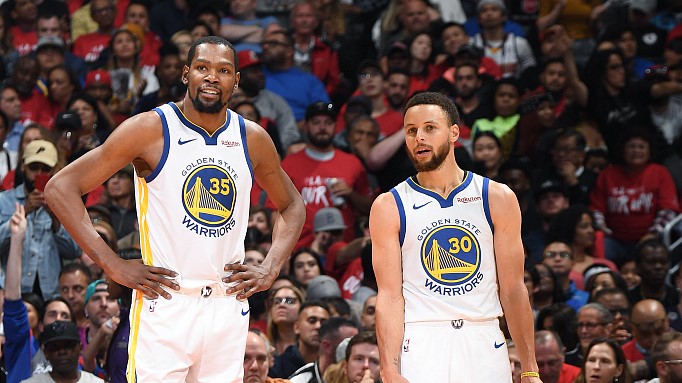
Stephen Curry #30 and Kevin Durant of the Golden State Warriors in Game 6 of the Western Conference first-round playoffs against the Los Angeles Clippers at the Staples Center, April 26, 2019. /VCG
Stephen Curry #30 and Kevin Durant of the Golden State Warriors in Game 6 of the Western Conference first-round playoffs against the Los Angeles Clippers at the Staples Center, April 26, 2019. /VCG
A volcano that has been sleeping for quite a while woke up this week as ESPN released the latest part of its "All-Time NBA Player Rankings:" Stephen Curry was put No. 13, one spot over his former teammate Kevin Durant of the Brooklyn Nets.
Since the day Durant joined the Golden State Warriors, one question was raised: who's greater? Durant or Curry? Together they made three NBA Finals and won two titles in a row. Durant pocketed two Finals MVP awards but he also revealed part of the reason behind his departure was that the Warriors have always been and will continue to be Curry's team.
As for Curry, though he was unfairly remembered for that missed behind-the-back pass in Game 7 of the 2016 Finals, he was already a two-time NBA MVP, played two NBA Finals and won one championship before Durant came. However, many still talked about Curry having three rings without even one Finals MVP (Durant had two).
Before we can answer this question, let's take a look at how the two had been doing before they became teammates.
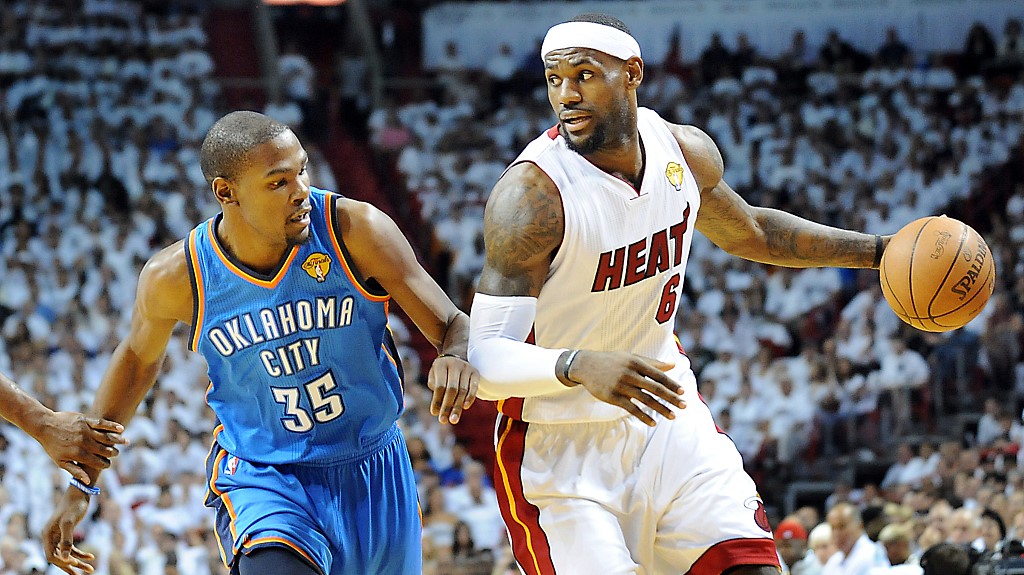
Kevin Durant #35 of the Oklahoma City Thunder tries to defend LeBron James of the Miami Heat in Game 3 of the NBA Finals at the American Airlines Arena in Miami, Florida, June 17, 2012. /VCG
Kevin Durant #35 of the Oklahoma City Thunder tries to defend LeBron James of the Miami Heat in Game 3 of the NBA Finals at the American Airlines Arena in Miami, Florida, June 17, 2012. /VCG
Durant was selected by the Seattle SuperSonics (the future Oklahoma City Thunder) with the second overall pick in the 2007 NBA Draft. He was given enough time and was allowed to shoot as much as possible in his first season, for one purpose: to adapt the game level in the NBA as soon as possible.
Having played two years as a shooting guard, Durant was put in the small-forward position in the 2009-10 season. Since then he won three straight scoring titles. In 2012, he and Russell Westbrook, James Harden made the NBA Finals before they lost to LeBron James, Dwyane Wade, Chris Bosh and the Miami Heat 4-1.
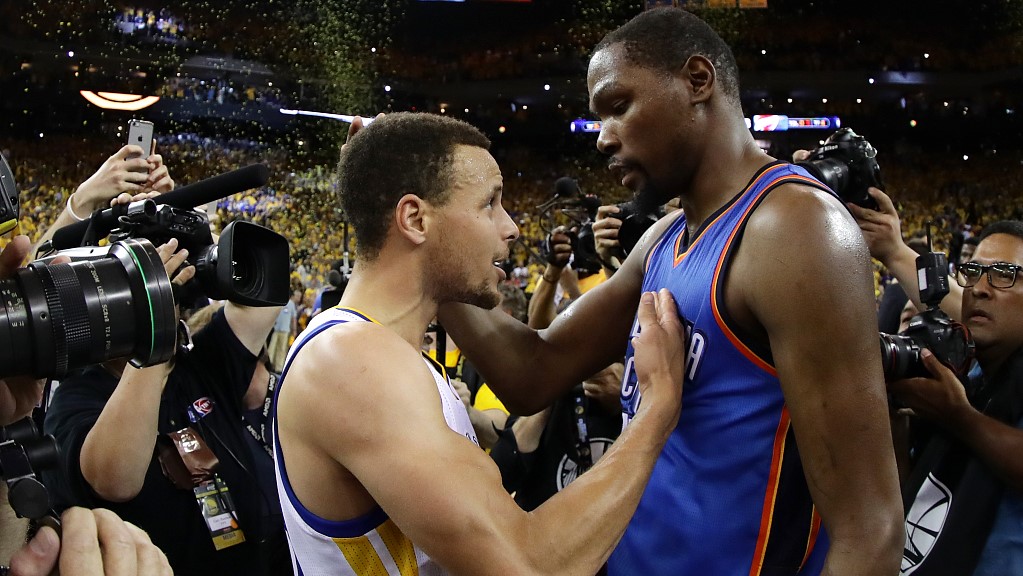
Stephen Curry (L) of the Golden State Warriors talks to Kevin Durant of the Oklahoma City Thunder after Game 7 of the Western Conference Finals at the Oracle Arena in Oakland, California, May 30, 2016. /VCG
Stephen Curry (L) of the Golden State Warriors talks to Kevin Durant of the Oklahoma City Thunder after Game 7 of the Western Conference Finals at the Oracle Arena in Oakland, California, May 30, 2016. /VCG
In the following four seasons, Durant claimed one more scoring leader award and one NBA MVP (2014). In 2016, he and Westbrook led the Thunder to the Western Conference Finals and once led 3-1 before they watched Curry and the Warriors take the comeback victory.
With 2.11-meter-height and 2.24-meter-wingspan, Durant at that time could score from anywhere. His long legs and speed made him unstoppable in fast break; he's too tall for anyone to hinder his shooting; his huge strides and athleticism made both a sharp slasher and a great defender. However, Durant was an okay orchestrator but he had problems with his court vision. Besides, he seemed unable to lead the team far in the playoffs by himself.
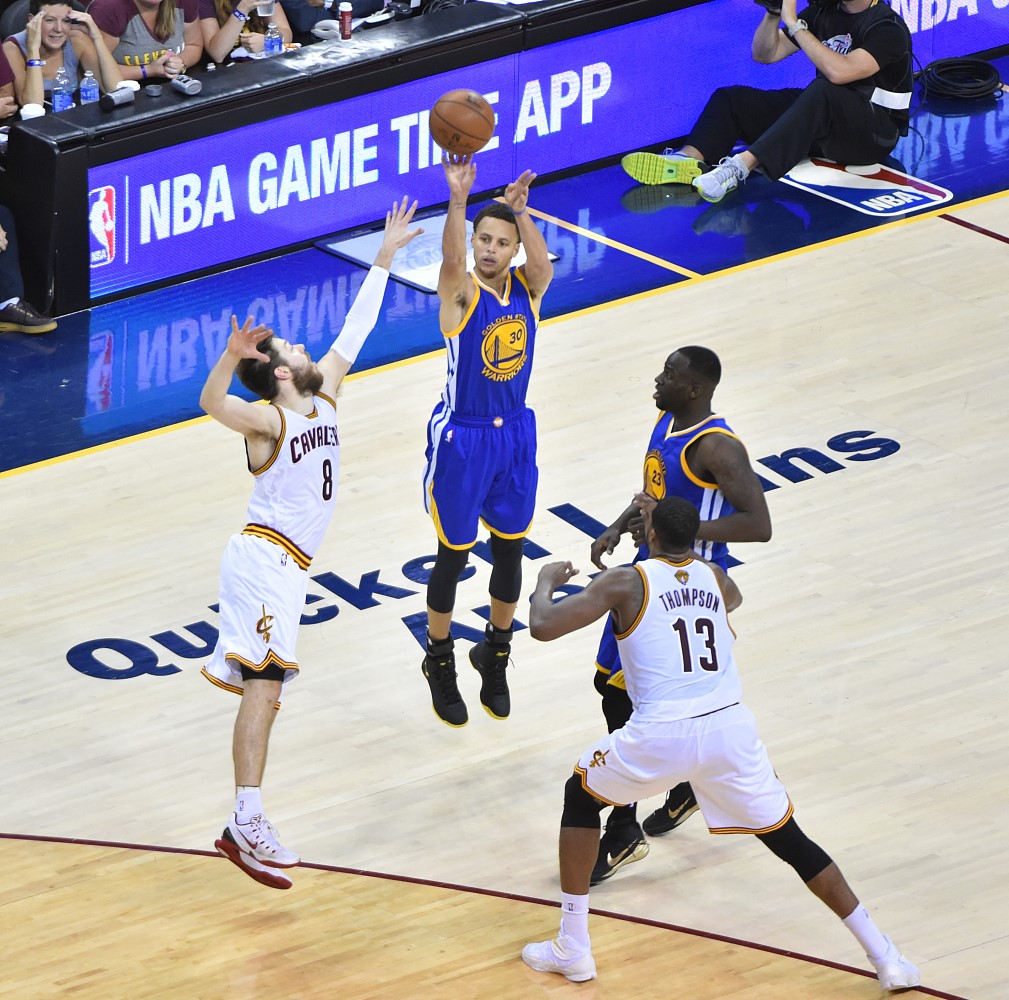
Stephen Curry #30 of the Golden State Warriors shoots the ball in Game 6 of the NBA Finals against the Cleveland Cavaliers at the Quicken Loans Arena, in Cleveland, Ohio, June 16, 2015. /VCG
Stephen Curry #30 of the Golden State Warriors shoots the ball in Game 6 of the NBA Finals against the Cleveland Cavaliers at the Quicken Loans Arena, in Cleveland, Ohio, June 16, 2015. /VCG
Curry was selected by the Warriors with the seventh overall pick in the 2009 NBA Draft. He was first seen as the second-in-command of Monta Ellis. Injuries haunted Curry for so long in the early stage of his career that many only saw that in him without realizing that he was more than a shooter.
In 2011, the Warriors selected Klay Thompson in the draft. In March, 2012, the team sent Ellis away to make them Curry's team. In the 2012 draft, the Warriors selected Draymond Green. In the following 2012-13 season, Curry and Thompson shocked the world for the first time with their 3-pointer shooting, hence the nickname "the Splash Brothers."
People began to see Curry as an All-Star guard and continued to be impressed by his shooting performance. Steve Kerr took over as the head coach of Golden State and in the 2014-15 season, Curry became the NBA MVP and his team won the NBA championship by defeating James and the Cleveland Cavaliers.
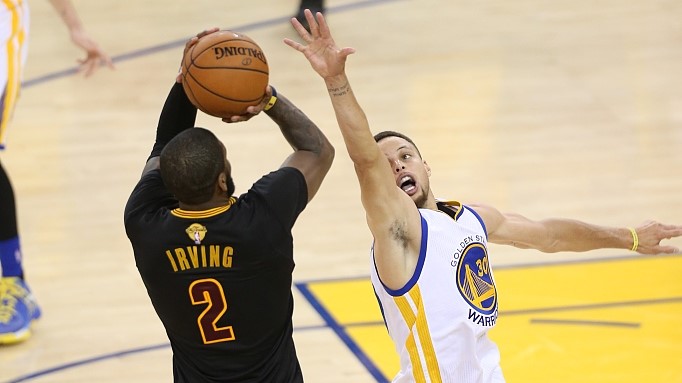
Kyrie Irving #2 of the Cleveland Cavaliers shoots the game0winning 3-pointer in front of Stephen Curry of the Golden State Warriors in Game 7 of the NBA Finals at the Oracle Arena, June 19, 2016. /VCG
Kyrie Irving #2 of the Cleveland Cavaliers shoots the game0winning 3-pointer in front of Stephen Curry of the Golden State Warriors in Game 7 of the NBA Finals at the Oracle Arena, June 19, 2016. /VCG
In the next season, Curry was the regular season MVP again, buried an epic 402 3-pointers and led Golden State to a record 73 wins. They defeated Durant and OKC in the playoffs, but watched the Cavaliers, led by James and Kyrie Irving, come back from 3-1 trail to win the title in the Finals.
At that time, Curry was on his way to being remembered as the greatest 3-pointer shooter in history, the second-greatest point guard in history and the best playmaker who did not need the ball in his hands. Nonetheless, his normal size and similarly normal athleticism made it possible for the opponents to control him with extreme tactics. He could not be the killer weapon the Warriors needed him to be.
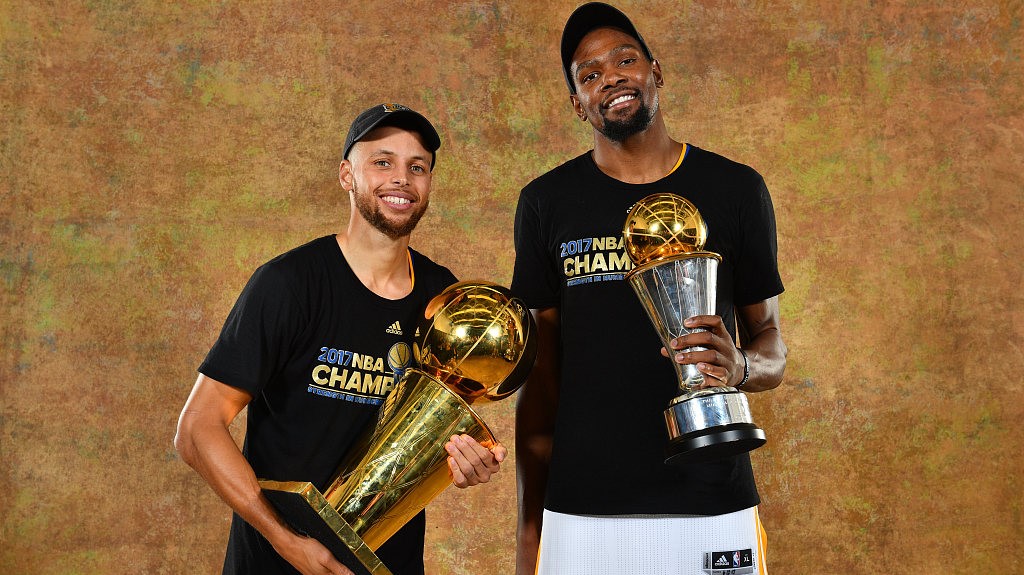
Stephen Curry (L) and Kevin Durant of the Golden State Warriors celebrate with the Larry O'Brien NBA Championship Trophy and the Bill Russell NBA Finals MVP trophy at the Oracle Arena, June 12, 2017. /VCG
Stephen Curry (L) and Kevin Durant of the Golden State Warriors celebrate with the Larry O'Brien NBA Championship Trophy and the Bill Russell NBA Finals MVP trophy at the Oracle Arena, June 12, 2017. /VCG
Then Durant and Curry became teammates, liberating each other. Curry continued to influence Golden State's offense in his unique way: his off-ball moving and shooting always distracted the opponents' defense. All Durant needed to do was to receive the ball and make the shot.
Of course, there were several teams who would whatever it took to control Curry – say, double teaming him right after he passed the midcourt line. That's when Durant would wield his scythe and reap the game. During the 2017 Finals, Durant dropped 35.2 points, 8.2 rebounds and 5.4 assists at field goal, 3-point and free rates of 55.6, 47.4 and 92.7 percent per game.
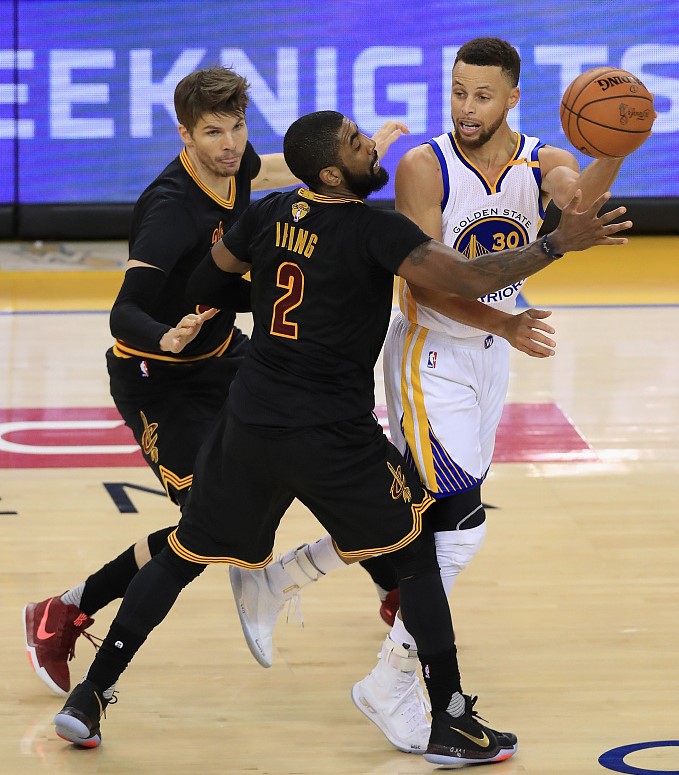
Stephen Curry passes the ball while his double teamed by Kyrie Irving #2 and Kyle Korver of the Cleveland Cavaliers in Game 5 of the NBA Finals at the Oracle Arena, June 12, 2017. /VCG
Stephen Curry passes the ball while his double teamed by Kyrie Irving #2 and Kyle Korver of the Cleveland Cavaliers in Game 5 of the NBA Finals at the Oracle Arena, June 12, 2017. /VCG
However, one thing must be pointed out. While Durant was slaughtering their defense, the Cavaliers continued to double team Curry – that's how much the rest of the league feared him. By the way, that did not stop Curry from putting down 26.8 points, 8.0 rebounds, 9.2 assists and 2.2 steals per game.
Simply speaking, Curry was a top team leader. His character, skills and playstyle made the Warriors' give-and-go offense possible. His influence was on everyone – Thompson and Durant did not have to meet the opponents' pressing defense because of him. The team could stand Green's terrible shooting for the existence of Curry.
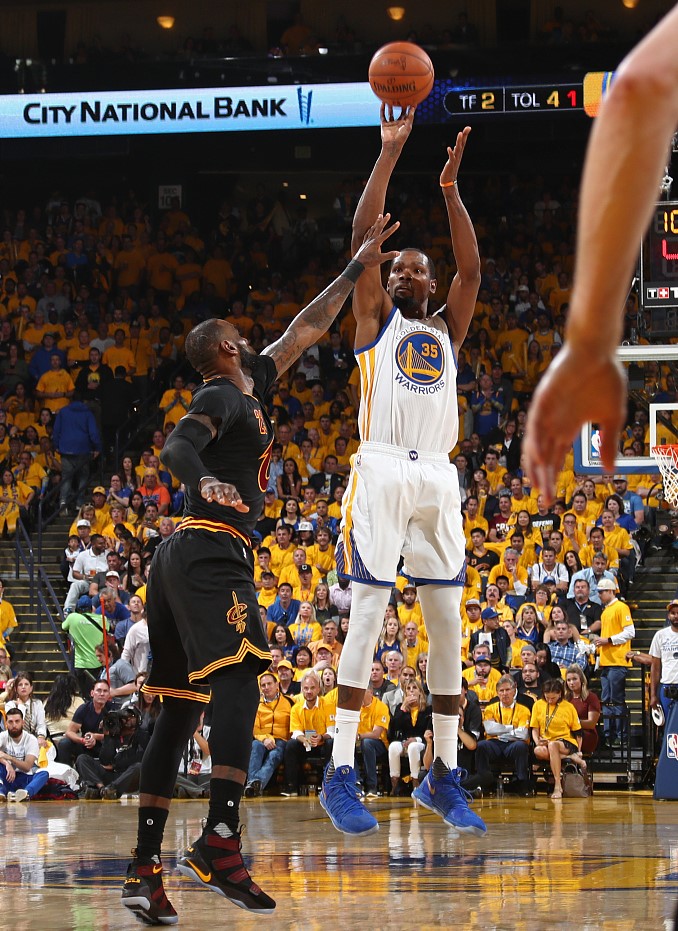
Kevin Durant #35 of the Golden State Warriors shoots the ball in front of LeBron James of the Cleveland Cavaliers in Game 5 of the NBA Finals at the Oracle Arena, June 12, 2017. /VCG
Kevin Durant #35 of the Golden State Warriors shoots the ball in front of LeBron James of the Cleveland Cavaliers in Game 5 of the NBA Finals at the Oracle Arena, June 12, 2017. /VCG
Durant in regular times was just part of Golden State's system and one of the beneficiaries of Curry's offensive influence. Nonetheless, when the team's regular system shut down and could not figure out any new move, Durant was their solution. He might not be a commander, but when he only needed to focus on scoring, Golden State had no better choice.
Curry would not win the other two championships of his with out Durant. The door to the championship would remain closed for Durant if he had not partnered with Curry. Now tell me, who do you think is the greater player?